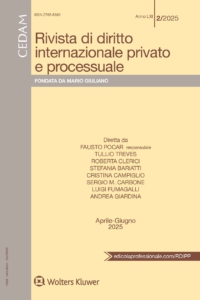Views
Children’s rights, private law and criminal law perspectives of parental child abduction
Written by Fanni Murányi, who will defend her PhD on Children’s rights, private law and criminological perspectives of parental child abduction at the Eötvös Loránd University (expected in 2024).
In this short summary of her research, Fanni highlights her conclusions on the role of the child’s views in abduction cases and the link between international child abduction and criminal law. She considered the legislative frameworks of the Hague Child Abduction Convention of 1980, the Brussels IIb Regulation (2019/1111) and the UN Convention on the Rights of the Child (UNCRC). She also investigated as well as the role of (domestic) criminal law. Read more
The Bahraini Supreme Court on Choice of Court Agreements, Bases of Jurisdiction and… Forum non Conveniens!
I. Introduction:
In a previous post on this blog, I reported a decision rendered by the Bahrain High Court in which the court refused to enforce a choice of court agreement in favour of English courts. The refusal was based on the grounds that the case was brought against a Bahraini defendant and that rules of international jurisdiction are mandatory. The Bahraini Supreme Court’s decision reported here is a subsequent development on the same case. The ruling is significant for many reasons. In a methodical manner, the Supreme Court identified the foundational justifications for the jurisdictional rules applied in Bahrain. Moreover, it clarified the role and effect of choice of court agreements, particularly their derogative effect. Finally, and somehow surprisingly, the Court supported its position by invoking to “the doctrine of forum non conveniens”, explicitly mentioned in its decision. Read more
“Other Appropriate Connections”: China’s Newly Adopted Jurisdiction Ground
Written by Jidong Lin, Wuhan University Institute of International Law
- Background
China’s newly amended Civil Procedure Law (“CPL 2024”), which came into effect on 1 January 2024, introduces several distinct and innovative changes. Among the most notable is the incorporation of “other appropriate connections” as a jurisdiction ground. Article 276 of the CPL 2024 addresses the jurisdiction of Chinese courts over foreign-related disputes where the defendant lacks domicile in China. Paragraph 1 of Article 276 lists six jurisdiction grounds, including the place of contract formation, place of contract performance, place of the subject matter, place of distrainable property, place of tort, and place of representative offices. As a supplement, Paragraph 2 provides that “notwithstanding the preceding paragraph, foreign-related civil disputes that have other appropriate connections with the People’s Republic of China may fall under the jurisdiction of the People’s Courts.” The term “other appropriate connections” represents a legal innovation not only within Chinese legislation but also on a global scale. Currently, there is no official interpretation or guidance on its precise meaning, making it essential to analyze and evaluate this jurisdiction ground and its potential implications for jurisdictional practices. Read more
News
Call for Papers: 4th APILA Conference, Doshisha University (Kyoto, Japan), 13–14 December 2025
The fourth annual APILA Conference will take place in person at Doshisha University in Kyoto (Japan) on Saturday 13 (Day 1) and Sunday 14 (Day 2) December 2025. The APILA Conference will be in the form of two days of roundtable discussions in English. Persons whose abstracts have been selected (see next paragraph) will deliver oral presentations in turn on Days 1 and 2. Each presentation will run for about 10 minutes and be followed by a discussion of about 10 to 15 minutes in which participants will have the opportunity to comment on the presentation. The objective of the APILA Conference is to assist presenters to refine prospective research papers with a view to eventual publication. Read more
Rivista di diritto internazionale privato e processuale (RDIPP) No 2/2025: Abstracts
 With a slight delay – entirely due to myself – I am pleased to announce the release of the second 2025 issue of the Rivista di diritto internazionale privato e processuale (RDIPP, published by CEDAM). This issue features:
With a slight delay – entirely due to myself – I am pleased to announce the release of the second 2025 issue of the Rivista di diritto internazionale privato e processuale (RDIPP, published by CEDAM). This issue features:
Francesco Pesce, Associate Professor at the University of Genoa, Il riconoscimento delle decisioni straniere in materia civile tra previsioni sulla competenza funzionale del giudice interno e comunicazioni alla Commissione europea (Recognition of Foreign Decisions in Civil Matters between Provisions on the Functional Jurisdiction of National Courts and Communications to the European Commission; in Italian) Read more
Virtual Workshop (in English) on September 2, 2025: Eva Lein on “PIL and dispute resolution in times of crisis”

On Tuesday, September 2, 2025, the Hamburg Max Planck Institute will host its monthly virtual workshop Current Research in Private International Law at 11:00 a.m. – 12:30 p.m. (CEST). Professor Eva Lein (Lausanne University) will speak, in English, about the topic
“PIL and dispute resolution in times of crisis”
In times of polycrisis, the law is put to the challenge. In international commercial transactions the question is how law can safeguard commercial activity, avoid a plethora of disputes, and encourage a pragmatic legal environment conducive to global economic recovery. This contribution discusses how dispute settlement mechanisms and private international law can be used to responsibly manage disputes in this context and to appropriately respond to future crises.
The presentation will be followed by open discussion. All are welcome. More information and sign-up here.
If you want to be invited to these events in the future, please write to veranstaltungen@mpipriv.de.



